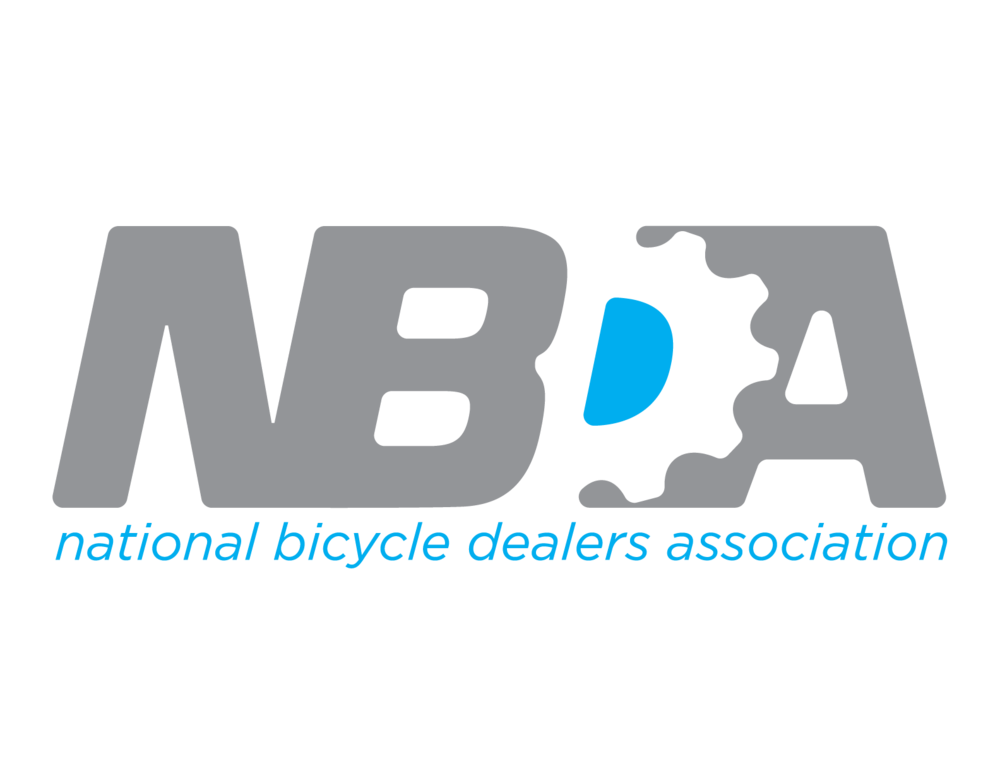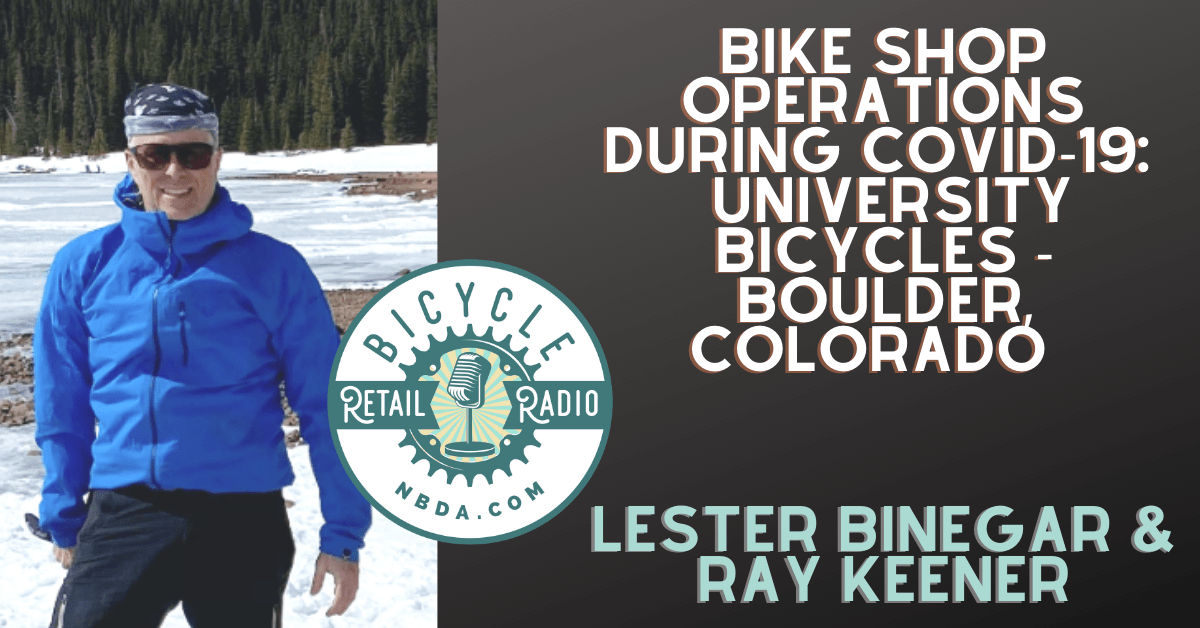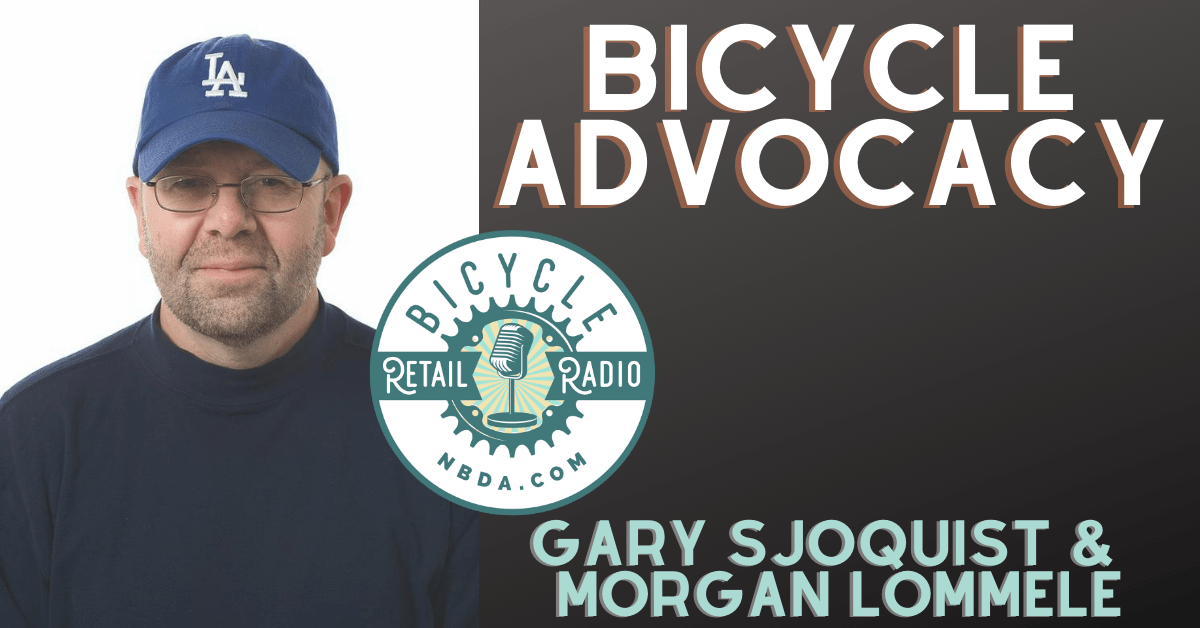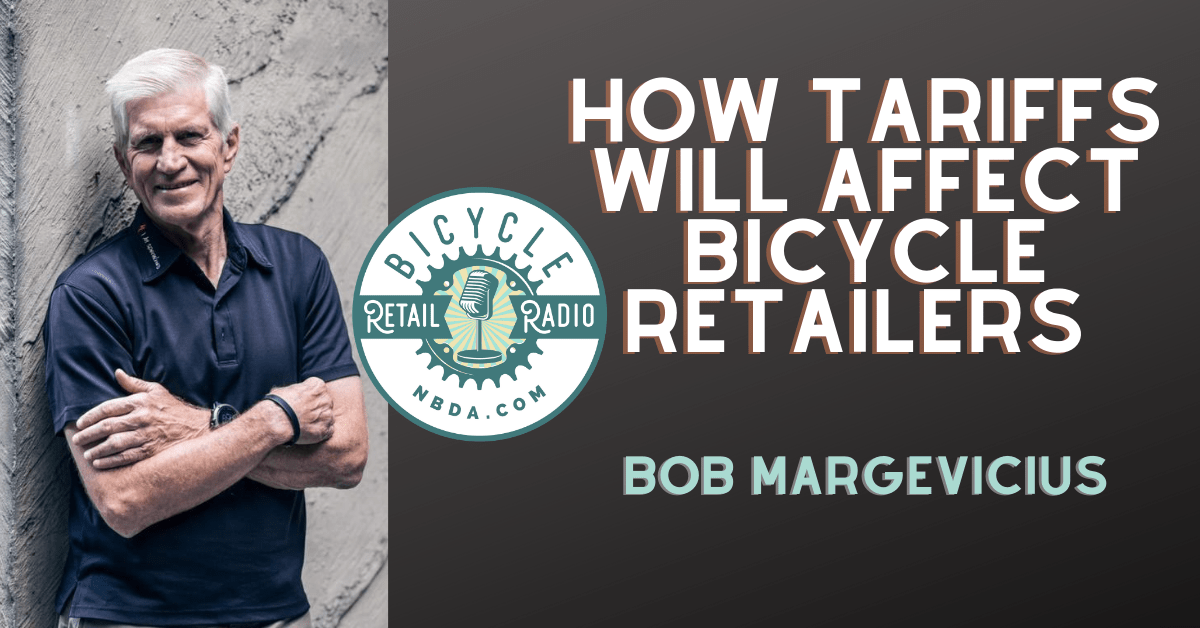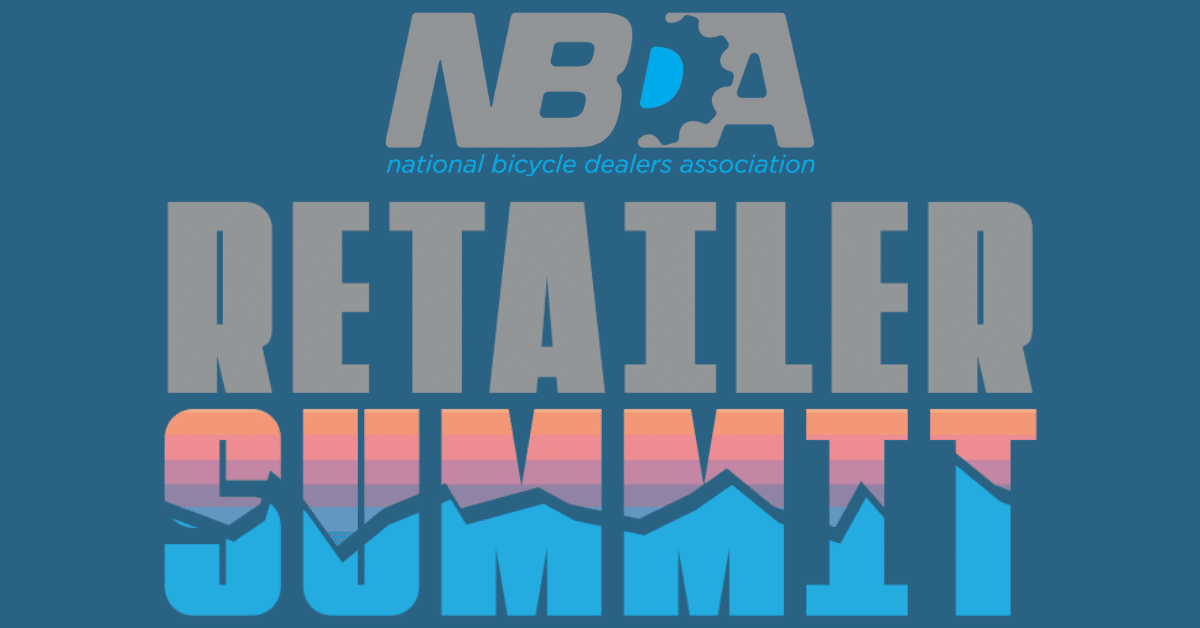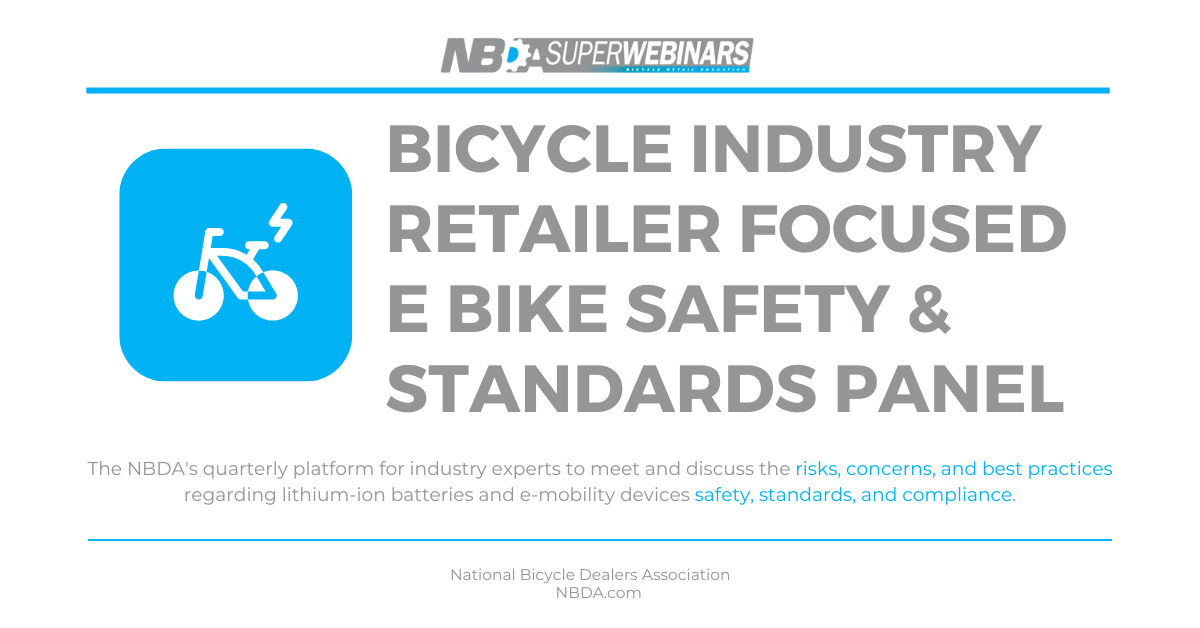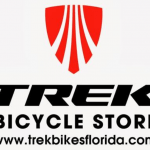Bike Shop Operations During COVID-19: University Bicycles
Ray & Lester
Tue, 8/18 10:44AM • 32:32
SUMMARY KEYWORDS
bike, bike shop, people, bicycle, business, industry, boulder, shop, essential, Lester, big, closed, pandemic, employees, customers, store, crisis, years, retailers, sales
SPEAKERS
Lester Binegar, Rod Judd, Chad Pickard, Ray Keener
Rod Judd 00:10
You are listening to Bicycle Retail Radio brought to you by the National Bicycle Dealers Association.
Ray Keener 00:16
Hi out there in social distance land. This is Bicycle Retail Radio brought to you by the National Bicycle Dealers Association. Hi, I’m Ray keener.
Lester Binegar 00:26
And I’m Lester Binegar.
Ray Keener 00:27
So Lester, let’s introduce ourselves to the audience a little bit, tell what you do and how you got there and I’ll do the same.
Lester Binegar 00:35
excellent. I am the general manager operator slash bookkeeper for university bicycles in Boulder, Colorado, and it’s been a long route to get there. But I’ve been with university bikes as the leader since 2006. And before that, I was lucky enough to be a rep in the industry for Fisher, Lemond, and Trek Bicycles. And that’s how I was introduced to the business of university bicycles before that I was a mechanic for five years. And before that, I got a degree in business and anthropology. And I have an intense desire to understand those two subjects, human behavior, and business. And I’ve combined that with what I see as a very environmentally good business in the bike business. And that’s my whole that was my whole goal in getting into the bike industry. And I had a very interesting year last year, I took the year off for being the general manager and became just the bookkeeper for the business. And that was great because I got a new perspective on things from the number side. I’m an emotional relationship type person, not a numbers person. And so having that combination really hit home for this year has helped me kind of take the business in a different path as far as my leadership goes.
Ray Keener 01:51
Well, and you’ve also got a combination that I’ve always said, is the key to success in bicycle retail which is to work in a shop and then go inside of a big company, especially being a sales rep like you were where you’re out visiting scores of dealers all the time, and then go back into retail that seems to work really well. Let me tell the audience just a little bit about myself, and that is that I got into the bike industry. When Richard Nixon declared war on cancer in 1974. I was a research scientist and we were doing absolutely nothing to kill cancer cells. The lab that I worked at closed up, and I went down to the bike shop I was hanging out at in Madison, Wisconsin, and they gave me a job and six weeks later, they sent me down to normal Illinois, to open up a shop for them. And so here we are, 45 years later, and I’m now membership and development person for people for bikes. I’m the retail editor for bicycle retailer magazine, and I run the education programs at community cycles here in Boulder. Those are my paid gigs and I have a bunch of other volunteers. stuff that I do. I was the executive director of the bicycle product suppliers Association BPSA, from 2013 until June 30, 2019, when we merged with people for bikes. So Lester, go ahead,
Lester Binegar 03:13
take a moment, I think we should warn everyone that we know each other well besides doing this podcast, and it’s been a great relationship to know you. You’ve been around a long time, and you have so much passion for the industry. So you’ve always really helped me, no matter what I told you. And this is a great opportunity to talk to you in this way. So thanks.
Ray Keener 03:33
Well, thank you, Lester, and back at you because I live in a world of politics, where people don’t often say what they’re really thinking, and I can always count on you to say what you’re really thinking. So enough mutual praise and adoration. So it’s COVID-19 that’s occupying everyone’s thoughts and actions this week. What is your bike’s doing and how is that shifted over the past long couple of weeks?
Lester Binegar 03:59
Wow. We made one big shift since the initial shift, I should say. And it’s been an amazing learning process to see what’s happened with my staff and what’s happened with the community. And both are to be commended. But for us, it’s all about survival. And I certainly would tell anyone listening to this, you have to survive through this. So think long and hard about what that’s going to take. For us. We knew we wanted to stay open because we consider ourselves essential to the community. And I know we’re going to get into that a little bit later. But we’re essential because our employees need us. Our communities need us there’s health and transportation involved. These are all ways to combat this virus. So we’ve done a number of steps to do business in a very safe manner, one customer at a time in the store for repairs. We’ve also gone to curbside and delivery for delivering sales products or products that we sold rather and one of the biggest things is we started selling online. So we now a Web Store for Business. This is something we’re thinking about doing this fall, something we’ve always avoided doing something we’ve never needed to do. But the folks that smart detailing, I’m going to give them a big, big, big plug here. Tremendous, awesome they took four days and got our entire store online to sell. And it’s really transforming our company during this probably six to eight week crisis period that we know we’re going to be in and enabled us to build success in the month of March, April’s coming. We can talk about what I think is going to come there. But for now, we’re controlling the flow of customers into our business. We’re selling bikes or doing repairs but at a much more of a controlled pace. So everything we’re doing is to keep as many people employed as we can and keep the store in survival mode,
Ray Keener 05:48
talking to shops around the country doing working on stories for bicycle retailers, the clamp has tightened over the last couple of weeks. I know you guys, for example, you were letting six people at a time. In the store and then you’re now you’re letting one person at a time the store I stopped by the other day to give your guys and gals their a big thumbs up for risking their health to do their jobs and keep cyclists rolling and the front door was locked. You know, you kind of have to knock on the front door. I don’t think there’s a password, but it’s definitely tightened down. So more restriction and also more shops closing as of last week, the brain survey on the website. 23% of the shops were closed at that point. And the number has gone up steadily since then.
Lester Binegar 06:33
Yeah, I think I think closing your shop is a survival strategy that can work. I think for us in the number of employees we are we have and who we are in the community. We feel like we need to stay open, but it has to be safe or relatively safe. There are risks involved, of course, but we’re really paying attention to the safety aspect and not creating this virus.
Ray Keener 06:54
Good for you. Well, you and Russ Chandler and other boulder retailers got together collected all of the shopping Owners’ emails from the shops around Boulder, which I don’t think has ever been done before. Lester, you’re communicating daily. I just saw some emails yesterday about how people are standing in line to try and get financial aid through this. It’s great to see that kind of collaboration among competitors. How did this emerge? And what are you learning from it?
Lester Binegar 07:19
Well, at university bikes, we have a philosophy of being friendly towards all the fellow bike shops in town. And I’ll tell you what, through this crisis, you can see the importance of it. I have tried hard to tell everyone what we’re doing in terms of communicating with our vendors, how we’re staying safe, the way we’re changing our business because I want all of my competitors to make it through this too. I truly believe in the bike. And I truly believe there’s not a problem with too many bike shops. There’s not just not enough customers, so competition breeds better business, and we all need each other. If two or three of the shops in Boulder go down. We can’t handle that volume is going to be too much. We need everyone To make it through this, and what you’ll find in that approach, and what we have found is we all help each other. Somebody comes into another shop that wants a brand that we carry that shop will send us that business and vice versa. We send business all over town. So I’m a big fan of being friendly with your competition. And Tammy in the community has a really strong bike shop infrastructure to help that community grow his cycling participation. And that’s, that’s what works in Boulder. So that’s kind of our philosophy there. I just, I want everyone to make it. I have a lot of friends out there too. So we’re really trying hard there. I think
Ray Keener 08:36
we’ve seen in the past just as an example, Jay graves who owned the bike gallery for many years up in Portland, Oregon. He’s a former president of the NVDA board. He started the Portland area bicycle Dealers Association back in my memory fails me maybe the early 2000s. And as long as the big guy and the strongest dealer in the market are willing to marshal that kind of force, it works. And then when Jay had to back away because of his other commitments, the whole thing fell apart. I mean, I think you’re, you’re maybe underestimating the fact that you guys are the power in Boulder in terms of sales volume and any other measure of success that you want to want to use. And the fact that you’re there to lead and to participate is no small thing.
Lester Binegar 09:23
Thank you. I’ll accept that. I’ll tell you what, when when it was time to decide to become essential. And have the government recognize that having this group of dealers that were already together and talking about things we marshaled support quickly in town, and even throughout the state, and even nationally, we are essential. And that was one of the benefits of having us all be friendly competitors.
Ray Keener 09:47
We’ll get to that. In a couple of questions here. I got a call from Alan fine yesterday who owns Turin, by schools in Denver, and he really succinctly laid out the current dilemma for retailers. Do you close So you’re eligible for funds as a closed business does closing when you’re considered an essential service, jeopardize your ability to get loans or funding? It seems like a really tough dilemma right now for shops.
Lester Binegar 10:13
I was on the phone with an attorney yesterday regarding this subject, and our whole path has been to sale. But it was never a consideration and closed unless we were made to. I think for some, it’s a really smart strategy and a great way to survive. And that’s what you got to do. You got to survive all of the impact of the bills coming through Congress and so forth. The banks, everyone doesn’t really know how to parse this out yet. So there’s going to be answered if you close as far as the ability to get funding and loans. It’s going to be there. But there’s a lot that we don’t know yet. So for us, at least we’re glad we’re open but I could see for somehow it’d be a good path to close in order to survive. And that’s the thing you got to look at the most you got to survive and get past this.
Ray Keener 10:56
Well, and we’re still looking at this damned if you do Do damned if you don’t I guess I’ll call it a topic. In fact, as soon as I got off with Alan fine, and this is the level of interconnection in the industry right now that I don’t think people really get to see from the outside that I immediately called Eric Rodel at peopleforbikes. They included this as a topic in their next meeting a couple of hours later with Jenn Dice and Morgan LOmmele and Alex Logaman and, and some of the higher-level people there. And they went to their people in Washington, DC and they’re doing research on this very topic to include in their next webinar, for which they have by far the largest number of people registered that they’ve ever had for a webinar. So I think it’s really hard heartening to see this cooperation and collaboration happening both at the local level and all the way up to the national level. So what do you think Lester, about this whole movement to have bike shops declared essential services? I know we had some fits and starts here in Colorado. Can you talk about how that rolled out? And how you and others got the governor to include bike shops when that wasn’t in the initial essential services order.
Lester Binegar 12:06
Well, let me go back to people for bikes in the effort to make bike shop essential. I’ve never seen anything moves so fast in your right. The credit is not good enough for people for bikes. And for the art community in general in the bike industry. I think a lot of people rallied around this and it happened so fast because of it. So it was just impressive to me. So as far as the movement to be considered essential, boy, could the bike industry make it as every shop close in the whole country? Sure. I think we would all survive and move past this in some way. But can we stay up and safely and help customers stay healthy and have transportation? I believe that that’s absolutely possible. But man the risk, the risk that goes through my brain of having this virus happen to go through our business, in effect customers or employees that we know and loves so much it an overwhelming thing to put on somebody’s shoulders. And so I’ve gone back and forth. I’ve got out of 50 employees about four that probably think we should be closed. Well, they definitely think we should be closed. I have many others who aren’t worried about a damn thing. They just want to get their paycheck and come to work. And so you have to parse all this out. At the end of the day, I think we’re essential. Are we critical, like medicine and food? No, but I think we’re in that next year. And so if we can stay open and be reasonably safe, I think that we should,
Ray Keener 13:32
I’ve seen some pushback from I guess I would call them consumers, saying, Hey, why are bike shops so essential, or I run I just saw today that Hobby Lobby is saying that they should be essential and they’re actually defying state orders across the country and staying open because they consider people having craft materials and then being able to masks and essential thing What is it about bike shops, that makes is essential and what do you say to customers? Who is like, wow, you know, I don’t think you guys should be open, I don’t think you’re essential enough.
Lester Binegar 14:06
I haven’t had to answer that directly with a customer yet I can tell you that you can escape it that some people are going to feel that way. So you, you’ve got to lay your bet. You’ve got to do the thing, do things the right way. And at the end of the day, that’s all you can do. So for me, I’m going to be really polite when someone questions directly to us. I’ve got employees with families, we have people that ride their bikes to work, we’re doing our best to kind of hang in there and help get through this, though, just sometimes there’s not an easy or correct answer, and you just do your best.
Ray Keener 14:42
You know, one other thing I wanted to point out, Lester, before we shift gears here a little bit about the industry’s efforts that sometimes go unseen, the lead story on bicycle retailer now and we’re talking here on March 31. The lead story headline is the world bicycle Industry Association. calls on all governments to declare bike repair essential. I wonder how many people in the industry know that Larry Pizzi, who runs the Alta cycling group is the chair of the people for bikes e-bikes subcommittee, Larry does as much work outside of his company job in this industry is any individual human that I can think of. Larry’s been on the board of the world bicycle Industry Association for three or four years. He represents North America on the world bicycle Industry Association, and he’s flying to fly into Brussels, Belgium, and go into these meetings and stuff. And here’s a world organization that people in our industry really aren’t even aware of. And because of the crisis that’s come up here on the brain website that they’re pushing for a global effort to get by Chuck’s declared essential,
Lester Binegar 15:49
I love it. I love it because when this is all over, or as we come down and away from this crisis, I see all of this working into our industry saver. To bring our incredible recreation and transportation back to life. So the work that’s being done there is, is all so crucial right now. And I think a lot of this just comes down to the US use bikes as toys for so many people when in reality, it’s just so much more than that. So big, big kudos to Larry.
Chad Pickard 16:23
What does being a member of the NBDA mean? Go to NBDA.com to learn about member benefits, programs, and preferred partner discounts.
Ray Keener 16:37
Lester, you’ve spent a fair amount of energy here locally organizing your fellow shop people. You were involved in the 20 collective which seems to me to have spawned the people for bikes ride spot program over a period of maybe three years. I also know because we’re holding the meetings at your shop, that you’re helping project bike tech get to Boulder high school started with bike mechanic classes in the Fall. And yet, having tried to sell stuff to you and Doug Emerson, the store owner over the decades, U bikes kind of does its own thing, which has been super successful. I would say that you’re not joiners, though we’ll talk to you more about that.
Lester Binegar 17:16
I will have, I have to be pretty forthright and just honest about what I’m going to say. And I don’t want it to come across wrong. But when I took over the store, it was already a thing where we have to figure out how to handle our volume. It’s not about how to get that volume. And so when that’s where your time and resources have to go, you become a little more aware of like, why am I taking the time to do this or join that or, or buy this, there’s no room to mess around when it’s a volume-based thing. So that’s a big thing that we just recognize in our business. And that’s what we work to handle and deal with. And the more that we handle and deal with it, the busier. We seem to get But that’s the honest answer to that. We do join some things. We’re part of two organizations. One is BMA, which is a boulder mountain bike Alliance. That’s the local trail advocacy mountain bike group. And the other is project bike tech that you mentioned. Both of these companies solve direct problems that affect and help our business and that’s why we’ve taken the time to join them and get involved and make sure they’re successful as much as we can. So boy you look at a project by tech were renamed mechanics, every bike shop needs mechanics, this is so crucial and such a direct way to help your own bicycle shop all throughout the country. And I would just encourage every shop that anywhere close to a school or that’s interested to get involved with this then that’s Yes, that’s a plug. Amazing. Yeah, and we do we have to shop to high schools in Boulder now that are going to be having this class. So I’m not gonna Go off too much on a tangent here, but we’re gonna have bike mechanics flowing into our store and have to turn away by mechanics. Imagine that. So yeah, that’s something we joined some other things we do, we limit repairs, we don’t have the ability again, with our volume of repairs to really handle all the repairs, this goes back to your competition, we send repairs to our competition because we want that customer to get their bike fixed in and again, in order to handle our volume, we have to do certain things like this. So we’re not joiners, but we really, really hope that we are overall really good for the bicycle community, not only locally but internationally because of all the people that visit Boulder. So yeah, that’s kind of a little bit of our philosophy and how we go about things.
Ray Keener 19:48
Well, two things I would say about that, first of all, and I think I’ve written about this in the brain, one thing that your mechanics do that’s amazing to me that every bike shop in America should do and I know everybody says that about their pet project, but someone brings a huffy in the store, the mechanic looks at it and he knows that there’s no way you’re going to work on this bike. But the mechanic, he or she will put the bike up in the stand, they’ll air up the tires, they’ll put some oil on the chain, they’ll explain to the customer, why you’re not going to work on their bicycle while you’re helping them get it rolling again and then handing it back to them and telling them maybe they could take it to another shop. I mean, to me that’s the only way to handle that kind of situation. The other thing I would say is that although you’ve turned out a lot of my pitches over the years when I’ve tried to sell you things, you’ve always waited until after I bought you lunch and told me no and very polite turns after that. So I appreciate
Lester Binegar 20:43
glad to be friendly. The Art of a bike mechanic telling a person no by using the words Yes, that’s a big key for us. We train that specifically. So it’s not no we can’t work on your bike. But here let me check your bike out. Let me make it safe for you. Oh, Here’s a shop that specializes in this type of repair, you should go there, they’ll help you out. So it’s an art. And it allows us to run a profitable service center and not get bogged down in it again if you if see our space and how many mechanics we have, yeah, we have to stay focused on the main business. And, again, there’s no time to mess around with big bills in Boulder, we actually have a goal of paying more pay per employee than any other shop, we want to be the highest-paid bike shop. So we have to really focus on certain things to make that happen. Agreed.
Ray Keener 21:34
Well, just a little bit of a shift back to January and February. I know it seems like we’ve always been under the pall of this pandemic. But my observation from talking to shop owners, sales in many markets were up substantially in the first two months of 2020. I know I was talking to shop owners in California and Arizona and Oregon, in Illinois who were up 30% just right on down the line. They kept saying 30% 30 percent and I called you didn’t we weren’t even talking about that. And you kind of echoed that same sentiment. So what do you think contributed to that? And it must be extra disappointing to see the air come out of the balloon. It’s such an abrupt way.
Lester Binegar 22:13
Because January and February Yeah, 30 to 40% growth. But it’s always hard to make much out of that because those are our two of our smaller months for the year. So March hit, and we’re gangbusters. And actually, I’ve got the numbers in front of me for March, just for this I, we’re going to end up 15% I’m sorry, 8%. up over last March, even with this last two weeks of hysteria going on in the retail world. So it’s all bike sale is e-bikes. Is mountain bikes are gravel bikes, it’s kids bikes. I mean, that’s, that’s what we’re selling to get there. So why that’s happening. I don’t know if it was a combination of a great economy and just people more focused on their health, but I think that’s where we’re going to end up after this pandemic. But the month of April, I’m worried There’s just no way Yeah, there’s no way. So we’re gonna find out what really happens this month.
Ray Keener 23:05
Lister, I saw one of those group emails among the retailers where you said that you were getting great communication and support from your vendors. Could you share some examples of that you, you get the sense that other shops are getting this or do an $8 million a year single store get more that attention?
Lester Binegar 23:24
I think any bike shop that has a great track record for paying their bills that communicates well with their vendors that has good relations with their sales reps, I think that any of our suppliers are going to work with you. It all goes back to just having good business principles to start with. Because there’s a time when you have to lean on those and this is the time and so I reached out to all of my especially our big creditors and just this was two weeks ago and you could see it all you can see this all coming and I’m like, we’re going to do our best. I’d like it to make sure you’re with us and you’re going to give us a chance to pay late if we need to. I told them all of our inventory. And I told them what we owed them and made sure they knew where we were there. So it’s just that communication and having a good track record. That’s this is super important when things like this happen, especially. Yeah, I want to ask you something right. Go ahead, based on your long experience, were you. Have you ever seen anything like this before? Were you here for the graph gas prices in the 70s? in the industry, for example, what do you recall any, anything that you can talk about? Similar?
Ray Keener 24:30
Well, actually, I got into the industry in 1975, which is the biggest drop off in bike sales in the history of the bike industry from 74, which was our high watermark to 75, which just returned back to a normal year so no, I kind of missed the boom. Although, again, interviewing Alan fine, I’m doing a story for brain about the Turin group, which was one of the first group efforts ever in bike retail in this country. And he told me that too. In the gas crisis, they were selling 150 bikes a day on the weekends, can you? Can you even imagine how that would look? But to me, you know, the biggest difference is, I think we’re going to see a gush once the pandemic blows through our society, and once people start returning their lives back to normal, I mean, these are like, April, May, June, July, these are the biggest months for most retailers in America and their sales curve. And as we’ve experienced before, when the weather’s really bad, and April or whatever, you get some of that back, you sure don’t get all of it back. And I’m afraid that the shops are going to be completely overwhelmed when they’re able to open back up fully and people are coming out of the woodwork getting their bikes fixed or buying new bikes. I think a lot of that depends on people’s state of their personal economy, that they’re maybe not going to be able to buy a new bike. But let’s talk a little bit about how you see the bike industry emerging from the pandemic here. You In a tough combination of trying to stay in business through your most profitable time of year, and trying to keep you and your employees safe and your customers rolling, how do you see the next few months playing out and what happens after
Lester Binegar 26:12
let’s talk about after, let me bring, bring us back to this month, we took really quick actions on laying offer staff. But we did it in the right way. They all want to come back, they’re going to come back, we’re going to reward them for coming back. So that was the key because unlike you, I think when this as this crisis dissipates, and I think it’s going to be a gradual thing. But once June or so hit, we’re counting on getting run over. And I think this whole this whole crisis plays into the bike industry’s hands, it’s a just a rare combination of people being a little bit tighter with their money, understanding the importance of being healthy and just a rip, maybe even a real realization they can work from home and get their work. Done. And I just think this plays into the bike industry’s hands. And I think that’s a good thing. I think the more we can fill our world full of bikes, the better. So we’re expecting, we’re expecting to get hit hard. We’re ready. Our employees are ready to come back. They’re going to make it through this. We’ve helped them understand how. And so we’re, we’re pretty positive for what’s going to happen.
Ray Keener 27:24
So in broader terms, let’s talk about the state of the industry overall, the median age of Americans is 38.2 years. And I would guess that the median age of bike shop owners is 15 to 20 years older than that, and industry leaders that people who run the companies and the nonprofit’s it’s similar, what is the next generation of industry leaders look like and where are they going to come from?
Lester Binegar 27:48
There’s room for new people and come on in. That’s my take. We’ve got a few younger leaders in our store that are learning quickly through a big crisis right now, but Everyone has always learned from previous leadership. And everyone’s also brought new ways of thinking. And that’s always going to happen that’s going to happen here. More than anything, I hope the US culture finds its way to the bike because of bike stalls. Almost every problem you can come up with, right? It’s your gym membership that your psychologists it’s, it’s the way to transport yourself. You can go down the list, it’s a way to fight pollution. So again, the future’s bright, so new people come on in. But at the end of the day business, there are no shortcuts in the bike industry.
Ray Keener 28:33
If you need to know your market, you need to work hard in every aspect of your business. There are no shortcuts. So it’s still going to take dynamic people that can think through all kinds of problems and deal with it and they’re going to learn the new people coming in. I can think of one in particular who I’m just blown away with. His name is Ian Christie from out west owns a big chain of bike shops out there and you watch that guy you watch his energy and he says Soak up knowledge. So it’s a combination of Yap, there’s room for new people, they’re gonna have to come in. But it’s, it’s the same old thing. It’s solid business principles that are going to get you through. So I’m loving, loving teaching, the younger part of our staff how to be leaders and how to understand our business. I need them to take over and so to those dogs, so I’m kind of anxious for the future and it’s fun to help kind of bring it into so I’m pretty bullish on that. So you’re talking about Ian Christie from summit bicycles. They have five stores in the San Francisco Bay Area, and Ian was up 30% in January in February. Well, I want to talk a little bit about what’s happened on more of the industry side because one thing that I don’t think people are super aware of coming out of the merger of BPSA and peopleforbikes peopleforbikes didn’t really have broad-based participation. They have a large staff of super smart and dedicated people and most of their work was done internally and they would get feedback from their board and direction from their board. But as BPSA, we had all of these different committees that were focusing on different parts of the BPSA activities. And since peopleforbikes took over there are four subcommittees now that have about 20 members each, and peopleforbikes has brought in 80 new people on these four subcommittees, mostly younger people and many more women, I would say the average age of the people serving on those committees has dropped those same 15 to 20 years that the average industry leader or a bike shop owner is older than the average. So there’s a lot of good stuff happening there. I think it’s hard for younger people to find their way into the leadership side. I know when I was in my early 30s. Did I think when are those old guys? Can we get out of the way and let some of us younger people lead and now I’m one of those old guys. So it’s kind of the opposite. dilemma. But there’s a lot of good things happening there. So let’s start. I think we’re kind of using up our time here. We’ve been on for just about 40 minutes. Any last thoughts before we wrap this up so I can go for a ride?
Lester Binegar 31:12
Absolutely. I just want everyone to know this. This is a relationship business. And I’m going to take every one to one simple way to succeed from Doug Emerson, who owns University bikes, learn people’s names and call people by their name. When you start there, you start that relationship, once you start a relationship, you’re in it. To become a relationship person, know people’s names, and just focus on the basics of business. And I just, I just want everyone to succeed. I just want everyone to succeed. I want a world full of bikes. So I really appreciate this opportunity. Ray, thanks for bringing me on board on this. Thanks.
Ray Keener 31:51
Well, likewise, Lester, and thanks to brandy and Rochelle in the NVDA for inviting us and thanks to you for the time and energy that we spent Preparing for this one. I know you’ve got a store to run.
Lester Binegar 32:03
No problem. Always good talking to you, right?
Rod Judd 32:05
Okay. Goodbye, everybody. Thanks for listening. This has been bicycle retail radio by the National Bicycle Dealers Association. For more information on membership and member benefits, join us @NBDA.com
 The NBDA has been here since 1946, representing and empowering specialty bicycle dealers in the United States through education, communications, research, advocacy, member discount programs, and promotional opportunities. As shops are facing never-before-seen circumstances, these resources offer a lifeline. Together, we will weather this. We at the NBDA will not waver in our commitment to serving our members even during this challenging time—but we need your support.
The NBDA has been here since 1946, representing and empowering specialty bicycle dealers in the United States through education, communications, research, advocacy, member discount programs, and promotional opportunities. As shops are facing never-before-seen circumstances, these resources offer a lifeline. Together, we will weather this. We at the NBDA will not waver in our commitment to serving our members even during this challenging time—but we need your support.
Now is the time to become a member as we join together to make one another stronger. Whether you’re a retailer or an industry partner, your membership in the NBDA is one of the best investments you’ll make this year.
Learn more about the benefits of being a member and join now.
